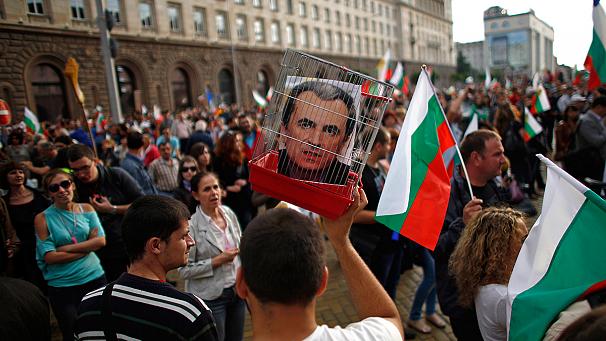
The Summer of Protests in Bulgaria
Publication: Eurasia Daily Monitor Volume: 10 Issue: 151
By:

The anti-government protests in Bulgaria have continued for over 60 days with no sign of resolution during the summer. Thousands of demonstrators demand the resignation of the Socialist-led government, deeming it corrupt and protective of oligarchic interests, including Russian political and business interests. Slogans condemning the perceived pro-Russian policy of the current administration have been a fixture in the daily rallies in downtown Sofia where protesters wave Bulgarian and European Union flags (Dnevnik.bg, June 14–August 14).
Bulgaria’s Socialist Party, for its part, is displaying increasingly “Putinesque” responses to the demonstrations. First, the Socialist leaders announced that the protestors were paid to demonstrate, but the public responded with chants of “We hate you for free.” Then the authorities claimed that the Soros Foundation organized the movement to serve Western interests. In the meantime, a series of unsuccessful provocations were staged to discredit the protest movement, culminating in a police beating on July 23. During August, the Socialists have magnified their efforts to counter the demonstrations through their own pro-government rallies around the country. However, the Sofia protest movement relocated to government seaside resorts as parliamentarians went on vacation on August 5 (BNT, July 23; BTV, Dnevnik, August 13).
Tensions in Sofia are expected to escalate on August 16 when an extraordinary parliamentary session will discuss President Rosen Plevneliev’s veto on state budget revisions. The changes would have allowed the government to borrow an additional 1 billion leva ($690 million) for social spending. The government claimed that the money would be used for increasing maternity leave pay (paid maternity leave in Bulgaria is two years) and for one-time assistance to first-graders, but President Plevneliev requested more transparency in the cabinet’s spending plans. “My motives to veto the law are based on principles and they are not political,” Plevneliev stated, calling on the government to develop more ambitious plans for increasing budget revenues (president.bg, August 8). The president’s support for the anti-government protests and his position on the budget has brought a mudslinging campaign against him and the presidential administration (BNT, Trud, Capital Daily, bTV, August 12–14).
The government in Sofia is a strange coalition of the Socialist Party (BSP) and the ethnic Turkish-based Movement for Rights and Freedoms (MRF)—in other words, an alliance of the former Communists and their former victims, the Bulgarian Turks, who were subjected to forcible assimilation during the mid-1980s. Making this political consortium even more problematic, the cabinet is also supported by the ultra-nationalist Ataka party, known for its anti-Turkish, anti-Semitic, anti-Roma, anti-EU, anti-NATO, and anti-globalist rhetoric (with no anti-Russian statements so far). With barely half of the seats in parliament, the Socialist-led coalition depends on Ataka for every decision, causing concerns within the EU about sustaining Bulgaria’s democracy. The two largest political groups in the European Parliament, the leftists and rightists, have called on Bulgaria’s Socialist-led government to distance itself from the nationalist extremist party Ataka (EurActiv, July 3). But this is impossible, as the Socialists need an absolute majority, or at least 121 votes, to overturn the presidential veto on state budget amendments, as one of example.
Former Prime Minister Boyko Borisov from the opposition Citizens for the European Development of Bulgaria (GERB) has called upon Ataka to abstain from attending the extraordinary parliamentary session on August 16. He vowed that if Ataka does not join the session, GERB would do the same and the president’s veto would hold. But Borisov predicted that Ataka would in fact show up and vote with the Socialist coalition as it has done since the current government was appointed in May (novinite.com, August 13).
The massive protests started on June 14 when media tycoon Delyan Peevski was appointed as head of the National Security Agency. His appointment was revoked under public pressure, but the demonstrations have not stopped for the past two months. The protest movement is clearly a revolt against the “red oligarchy” created in the 1990s under the wing of the former Communist party and the State Security Services mainly through misappropriated public funds. The Socialist party today has practically turned into a party of oligarchs who protect their own interests instead of those of workers and the middle class, wrote prominent writer Vladimir Levchev in Dnevnik on August 14.
Peevski’s short-lived appointment in June was symbolic because of his connections, through the Corporate Commercial Bank of his partner Tsvetan Vassilev, with the Russian Foreign Trade Bank (VTB), the largest state-owned foreign investment bank in the Russian Federation. VTB opened an office in Sofia in 2012 aiming to forge lucrative business deals throughout the Balkans. By investing Russian money, Vassilev and Peevski have allegedly acquired significant shares in Bulgaria’s telecommunication and tobacco industries (Capital Weekly, Focus, August 3).
The symbiosis between the traditionally pro-Moscow Socialist party and oligarchic opportunists such as Peevski from the ethnic Turkish MRF became the spark that ignited Bulgaria’s civil society. Its focus is bigger than domestic politics and party squabbling. Its main concern is that mafia-type relations between business and politics are overtaking an EU member country. Furthermore, Bulgaria has become a target for financial penetration and increased political influence from Russia. Until Bulgaria’s political parties radically change the way they conduct business, it is unlikely that the mood of protest will disappear any time soon. For the first time in years, Bulgaria’s civil society is determined to see real change, and the protests are likely to escalate come autumn.




